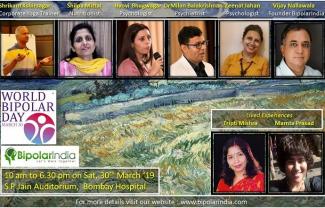
Vijay Nallawala who has been running a peer support group for persons with Bipolar Disorder and their caregivers, talks about the upcoming Bipolar disorder conference in Mumbai and the value of peer support communities.
Bipolar Disorder, previously known as manic-depressive illness, is a brain disorder that causes unusual shifts in mood, energy, activity levels, and the ability to carry out tasks. Well, that definition does not adequately bring across what a person struggling with it has to actually deal with on a daily basis.
Behavioural Impact of Bipolar Disorder
The most common perception among those who do know a little bit about it is that it entails 'extreme shifts of mood between mania and depression'. What is not commonly known is how it disrupts functioning. During severe mood phases, Bipolar Disorder affects cognitive function to a great extent. Of course, the degree of cognitive impairment varies from person to person. This impairment can manifest in forms of poor memory, low concentration and focus and inability to take decisions. During severe depression, everything slows down to a crawl whereas during hypomania or mania, racing thoughts can make focus and concentration difficult. Another major concern is impaired judgment which can lead to injudicious behaviour. Mania and reckless behaviour go hand in hand.
The need to belong
Those affected find it difficult to maintain harmonious relationships with family members and in social circles. Holding a job for long is another challenge and a high percentage of those affected are either unemployed or engaged in work below their qualification/skill levels. In India, we have a long way to go where it comes to inclusive policies for mental health in general. From the glaring gap in India between need for mental health care and its supply, to the stigma and discrimination in society, much needs to be addressed. Inclusive hiring policies, nurturing those with mental illness at the workplace would help reduce unemployment among those from this community. The extent of the challenge? According to the National Mental Health Survey 2016, 150 million Indians are estimated to be suffering from mental illnesses which require intervention. Of these, those with Bipolar Disorder constitute 4 million (which could be gross underestimation of numbers due to under diagnosis/ under reporting). It is time that society creates an environment where those with mental illness feel that they belong.
Management of Bipolar Disorder and Recovery Options
Acknowledgement and acceptance of the fact that Bipolar Disorder is a serious mental disorder which requires psychiatric help is the first step. Although broadly speaking there is no known cure for BD, it can be managed with the help of medication (a mix of drugs which might consist of mood stabilisers, antipsychotics and antidepressants) and psychotherapy. With discipline and determination, there are many who manage to overcome the considerable challenges to live functional, successful lives.
What Recovery Means to a Bipolar Warrior.
Medication and therapy are fundamental to recovery. A supportive and understanding family is worth its weight in gold. Family members could not only keep a watch for symptoms and early warning signs of an impending mood swing, they can provide an encouraging and nurturing environment which is so important to keep the affected person motivated and on track.
This includes daily exercise, a balanced nutritious diet, yoga (especially pranayam), creative expression (such as painting, music and writing), mindfulness practice and sleep hygiene.
The Value of Peer Support Communities
It is amazing how easily people can open up to other people who are dealing with similar challenges. Peer Support Groups, whether online or offline, are usually focused towards addressing a common pain point, such as alcohol addiction (AA, for instance). We at BipolarIndia first launched our peer support community in 2013 as an online platform. Since three years, we have extended our outreach to an offline footprint spread across various cities of India. Currently we hold monthly peer meets in Mumbai, Delhi/NCR, Kolkata and Bengaluru. Those who attend such meets benefit in multiple ways. Firstly, sharing one's story with others who have also faced similar challenges creates a bond of trust and empathy. Opening up without the fear of being judged or derided lightens one's burden. Beyond that, there's so much to learn from the lived experiences of others in terms of coping tips and survival armoury.
Success stories of those who are doing well inspire others and instill hope. Knowledge sharing about locally based Psychiatrists and Psychologists is also a helpful guide. Peer groups are also known to be effective in encouraging adherence to treatment and ensuring discipline in terms of avoiding the no-no's such as alcohol and recreational drugs.
World Bipolar Day 2019 National Conference
30th of March is World Bipolar Day, a day the World celebrates with Conferences and public awareness campaigns to mark the birth anniversary of troubled painter, Vincent Van Gogh. Van Gogh, incidentally was said to be suffering from Bipolar Disorder although there are divergent opinions about his diagnosis. We at BipolarIndia, for the fourth year running, are hosting a National Conference in Mumbai. Learn from the select experts from varied fields such as Yoga, Nutrition, Psychology & Psychiatry. Get inspired by rousing stories of lived experiences.
This conference is ideal for those affected with Bipolar Disorder, their Caregivers and for Psychologists or Psychology students. Be there, join in with people who have registered from faraway places to learn and grow.
To know more about the event and to register for it, check the event post on our website.
BipolarIndia is grateful to Patients Engage for being such a supportive platform for individual voices and for communities like ours.
Vijay Nallawala, Founder, BipolarIndia
Twitter: @VijayNallawala






